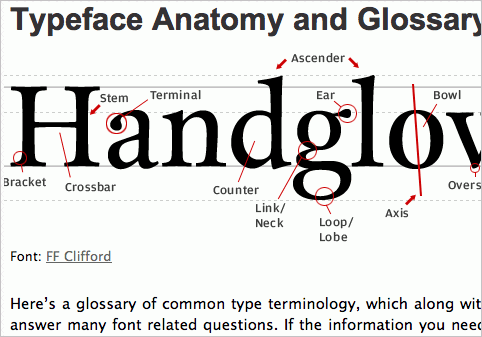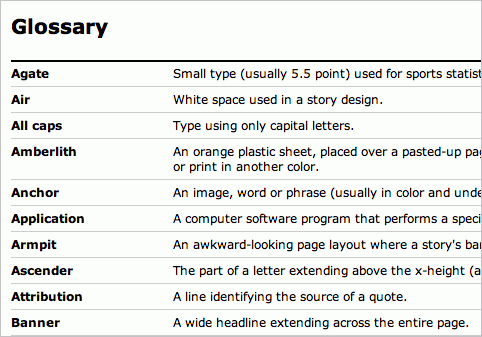Useful Glossaries For Web Designers and Developers
These glossaries are especially useful for those of you who are just getting started in the online business world. By understanding that basics of the core materials that make up whatever it is you are getting into, you will be able to have a better understanding of what’s going on in your industry, as well as be able to learn faster.
Typography Glossaries
You would be surprised how many designers, especially graphic designers, out there don’t know even the most basic of typography terms. I am guilty of this myself. I could probably count the number of typography terms that I know on two hands. I couldn’t tell you what makes one font better than the other aside from the way it looks. If you find yourself in this boat and want to learn more about the basics of typography, these glossaries are a good place to start.
- Fontshop Typeface Glossary
- Typenow Glossary
- Large Typography Glossary
- Adobe Typography Glossary
- Thinking With Type Glossary
- The Web Designer’s Typographic Glossary
- A disagreeably facetioustype glossary
- A Typographic Glossary
- Type Terminology
- Font Menu Type Glossary
- Typography Glossary
Usability, UX and IA Glossaries
Do yourself a favor and start learning as much as you can about usability and design. You would be surprised how much of a difference a user-friendly landing page can make. Simple things like button shapes, call to action wording, and colors can play a big part in how users interact with your design. Understanding the basics of usability can help you create better designs. Start by learning the basic terms in these glossaries.
- Usability Terms
- The Complete List of Usability Terms
- Glossary of Usability Terms
- Universal Usability Glossary
- An Evolving Glossary of Experience Design
- Interaction Design UX Glossary
- Information Architecture Glossary
- The Information Architecture Glossary (PDF)
Marketing Glossaries
Following closely on the heals of good usability is understanding marketing. I wouldn’t go so far as to say they are one in the same, but they are definitely closely related. Better understanding how marketing works can do loads for your business and your clients business. Start educating your self by studying up on some of the more basic marketing terms. Or if you are already pretty market savvy, but want to brush up, there are a number of more “advanced” glossaries below as well.
- The Fundaments Of Web Analytics
- Marketing Glossary and Terms
- Professional Marketing Glossary
- Business Marketing Terms
- Viral Marketing Glossary
- Brand Glossary
- Branding Glossary
- Advertising Glossary
- Glossary of interactive advertising terms (pdf)
- Google AdWords Glossary
- Google AdSense Glossary
- Marketing Glossary
CSS, (X)HTML, DOM and JavaScript Glossaries
As designers and coders, we often need to look up the definition and the applying rules for an attribute, selector, tree node, a property or a HTML-tag. Therefore lookup-references may come in handy. Good news – there are many reference resources out there. Below you’ll find some really good ones.
- Sitepoint CSS Glossary
- Codestyle CSS Glossary
- CSS Properties (HTMLDog)
- CSS Properties (Sitepoint)
- CSS Selectors
- CSS @-Rules
- CSS Concepts
- The complete CSS guide (Westciv)
- CSS References at W3C School
- HTML 4 Elements (WDG, HTMLHelp)
- HTML Tags
- HTML Elements
- HTML Common Attributes
- HTML Concepts
- Full HTML Reference
- JavaScript DOM Core
- Full JavaScript Reference
- Full jQuery Reference
- Visual jQuery Reference
- XML Glossary
Graphic Design Glossaries
Perhaps it is because many designers are self taught that they only have a limited understanding of professional graphic design terms. Sure, we all know what cropping and justifying are, but there are so many other terms out there that many of us don’t know. While we can probably get away with never knowing them, it can’t hurt to learn. This is especially true for new designers. Why not go ahead and learn these terms early on while you are still in the learning process?
- Graphic Design Glossary, Terms and Definitions
- Glossary of graphic design and web page design terms
- Color Glossary
- Graphic Design Glossary
- Graphic Design Glossary
- Graphics Glossary
- Logo Design Famous Brands Glossary
Print Design Glossaries
The transition from print design, with its absolute positioning, fixed layouts and grid-structure to more dynamic and flexible web design isn’t an easy task. Therefore if your colleague is just doing the switch from print design to web design, you may need to be able to communicate with him in “his” or “her” language. Therefore general terms from print design may come in handy as well. Do you know what “4 over K”, “semi-gloss finish” or “column rule” mean? OK, let’s dive into the classic print design terms.
- Newspaper Design Glossary
- Glossary Of Common Print Design Terms
- Print design glossary
- Design and Print Glossary
- The Glossary Of Printing Terms
- Glossary of Printing and Graphic Terms
Web Design Glossaries
I would think that many professional and full time designers and developers already know just about every term in these web design glossaries. However, I know that when first venturing into web design, many of the terms associated with the industry can be a bit foreign. Thus, I decided to add this collection of web design glossaries to the list for those who are getting into web design and developing and could use a little extra help figuring out what everything means.
- The Motive Web Design Glossary
- Web Design Industry Jargon: Glossary and Resources
- Huge Web Design Glossary
- Sitepoint Web Design Glossary
- Web Design Glossary
- Web Design Glossary
- Web Design Group Glossary of Terms
- Photoshop Glossary
- Complete Glossary of Photoshop Terms and Definitions
SEO Glossaries
Try to do some search engine optimization for your website or your clients? Knowing what you are talking about is always a good idea, for both you and your client. So often clients want some search engine optimization done, but really have no clue what they are asking for or what you are saying. Referring them to some of the search engine optimization glossaries below can do wonders to save you and your client a world of headaches when it comes to SEO work.
- SEO Glossary
- SEO Glossary for 0 to Z
- A Complete Glossary of Essential SEO Jargon
- Search Engine Optimization (SEO) Glossary of Terms
- The SEO Book Glossary
- SEO Glossary
- Search Engine Optimization Glossary
Social Media
Because it seems like something new is always popping up on the social media scene, it is only natural that there may be terms we aren’t familiar with from time to time. This is especially true for those who are just venturing into online business and social media for the first time. This also goes back to the comments I made about SEO terms. You can save you and your clients some frustrations by making sure you are both on the same page by understanding what each other is talking about. Using these glossaries to explain yourself better to a client will work wonders in keeping you two on the same page.
- A-Z of Social Media
- Glossary of Blogging and Social Media Terms
- The Bloggers’ Glossary
- Social Media Glossary
- 25 Social Media Buzzwords Explained
- Giant Bloggin Terms Glossary
Twitter Glossaries
You had to know this list of glossaries was coming! With so much going on in the world today about Twitter, it is only natural that new Twitter users are popping up every day. When one first gets into Twitter the list of associated terminology can be very much like foreign language. For outsiders looking in, I think that is very much the case. I think my local news station needs to read up on these, as every time they talk about Twitter they look deeply confused about the words that are coming out of their mouth.
- Twittonary - The Twitter Dictionary
- My Twittonary: Every Twitter Term and Tool I Can Find
- Twitterspeak: 66 Twitter Terms
- Twitter Glossary
- How to Speak Twitter
- Twitter Glossary: Twitter Lingo Explained For The Utterly Confused
CMS Glossaries
Wordpress, Joomla, Textpattern and other CMS have a lot of its own and unique terms, tags and definitions. Because many people who run blogs don’t know the first things about servers, PHP, or even Wordpress for that matter; it can be a bit intimidating. But, as many CMS users know, there isn’t much to it once you know how everything works. The glossaries below can help both developers and new users to WordPress, Joomla and TextPattern.
- Wordpress Codex Glossary
- Joomla 1.5 Glossary
- Textpattern Tag Glossary
Software Development
While most web designers do both front-end and back-end-development in their regular work, it may be helpful to have a good understanding not only of front-end (covered above), but also of common software development. A glossary with terms used in agile development, software engineering, prototyping and general software development. Apart from that you may want to understand what your colleagues-coders in Python, Ruby on Rails or Java talk about when throwing around fancy programming terms, right?











